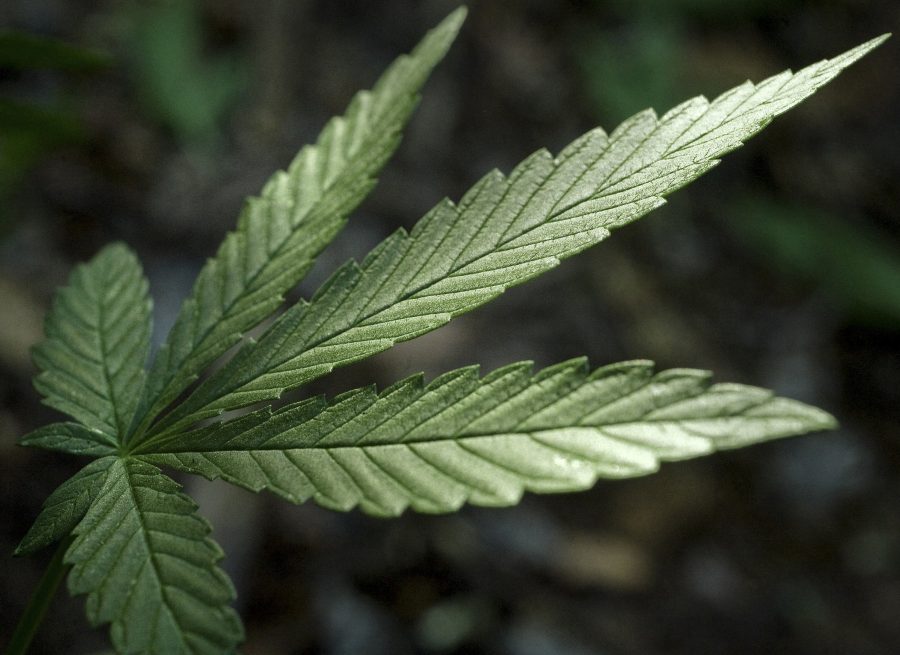Lawmakers propose legalizing recreational marijuana to help ease budget deficit
Randall Benton/Sacramento Bee/TNS
A cannabis leaf. Legislation introduced last week would legalize recreational marijuana in Illinois to help ease the budget deficit.
March 29, 2017
Bills introduced last week by two state lawmakers who represent small parts of Evanston would legalize recreational marijuana in Illinois.
The two bills — one introduced by state Rep. Kelly Cassidy (D-Chicago) and another by state Sen. Heather Steans (D-Chicago) — would make Illinois the first state in the Midwest and the ninth state in the nation to legalize recreational marijuana.
Under the legislation, residents 21 and older would be allowed to possess, grow or buy up to an ounce — or 28 grams — of marijuana. Residents would also be allowed to grow up to five plants of marijuana, and licensed businesses would be able to sell marijuana products subject to regulation.
The bills would require the Illinois Department of Public Health to create rules regarding regulation within 180 days of their passage, so more specifics are yet to come, Cassidy told The Daily in the email. The legislation would require products to include a list of ingredients, nutritional information and child-resistant packaging, and the proposal also includes restrictions on additives and other potentially toxic ingredients, Cassidy said.
Cassidy and Steans said legalizing marijuana could help solve the state’s multibillion-dollar budget deficit by contributing between $350 million and $700 million in new tax revenue.
The revenue estimation comes from the Marijuana Policy Project, a national advocacy group that considered the legislation’s proposed $50-per-ounce wholesale tax, the state’s 6.25 percent sales tax, federal marijuana consumption data and recreational marijuana prices in Colorado.
“That’s money for our schools, anti-violence programs and social services,” Cassidy said. “If we choose to leave that money on the table, it will have to come from other taxes or extremely painful cuts.”
The bills earmark 50 percent of revenue from marijuana sales for the state’s general revenue fund and 30 percent for the state’s Board of Education. The remaining 20 percent would go to the Department of Public Health for implementation and a public awareness campaign about the dangers of various addictive substances, Cassidy said.
Cassidy sponsored legislation that led to the legalization of medical marijuana in Illinois in 2015, and Steans sponsored legislation last year that decriminalized the possession of small amounts of marijuana.
Steans told The Daily that legalizing marijuana can make regulation of it easier and help the economy.
“Prohibition doesn’t work really,” Steans said. “Taxing and regulating (marijuana) therefore is a much better way to go about it.”
At the national level, White House press secretary Sean Spicer said in February that President Donald Trump’s administration would look into greater enforcement of federal marijuana laws, even in states that have legalized marijuana. U.S. Attorney General Jeff Sessions has also publicly expressed concern over the legalization of marijuana.
“I don’t think America is going to be a better place when more people are smoking pot,” Sessions told reporters in February.
Cassidy said other states that have legalized marijuana “have managed the federal inconsistencies just fine,” and Steans said it will be hard for the federal government to undo state laws legalizing recreational marijuana.
But not everyone supports the proposed change.
Ed Wojcicki, executive director of the Illinois Association of Chiefs of Police, told The Daily the association opposes the bills because there is a “public safety threat” posed by marijuana use. Enforcement issues also exist with legalizing marijuana and trying to identify drivers who may be under its influence, Wojcicki said.
“The science is just not there yet to easily and adequately measure how much a person is impaired,” he said.
Cassidy and Steans plan to hold joint hearings in the spring on the proposed bills to educate other lawmakers and receive feedback.
Steans said public support for legalizing marijuana in Illinois is strong, pointing to a poll released Monday from the Paul Simon Public Policy Institute at Southern Illinois University-Carbondale that showed two-thirds of voters support legalizing recreational marijuana if it is taxed and regulated like alcohol.
“It doesn’t mean lawmakers are there yet,” Steans said. “We really want to get feedback on the right way of structuring the bills.”
Email: [email protected]
Twitter: @Billy_Kobin


